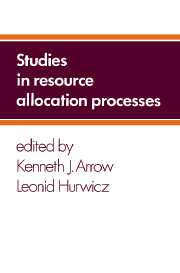Book contents
- Frontmatter
- Contents
- Preface
- Acknowledgments for reprinted articles
- PART I General introduction
- PART II Economies with a single maximand
- PART III Economies with multiple objectives
- PART IV General characterizations of allocation processes
- Optimality and informational efficiency in resource allocation processes
- Appendix: An optimality criterion for decision-making under ignorance
- Author index
- Subject index
- Index of examples
Optimality and informational efficiency in resource allocation processes
Published online by Cambridge University Press: 04 April 2011
- Frontmatter
- Contents
- Preface
- Acknowledgments for reprinted articles
- PART I General introduction
- PART II Economies with a single maximand
- PART III Economies with multiple objectives
- PART IV General characterizations of allocation processes
- Optimality and informational efficiency in resource allocation processes
- Appendix: An optimality criterion for decision-making under ignorance
- Author index
- Subject index
- Index of examples
Summary
Introduction
This paper is primarily devoted to a study of the (static) optimality properties (e.g., Pareto-optimality of the equilibria) of certain resource allocation mechanisms. It is shown that one such mechanism (the “greed process”) is optimal in a class of economic environments much broader than the class for which perfect competition is optimal. More specifically, the greed process has the desired optimality properties for all environments from which so-called external economies or diseconomies are absent; unlike perfect competition, the greed process does not presuppose the absence of indivisible goods, of discontinuities, or of increasing returns. However, the greed process lacks the dynamic (stability) properties known to hold for perfect competition, at least in certain special cases.
That the greed process does have certain optimality properties would be of little interest, were it not for the fact that it belongs to a class of informationally decentralized processes and hence shares with perfect competition a feature that has been extolled as one of the main virtues of the classical market mechanism. Still, just because it is designed to cover a broader class of environments, the greed process calls for more information (is informationally less efficient) than the competitive mechanism. To illustrate this, a variant of the latter (called “quasi-competitive”) is constructed and is shown to have the desired optimality properties when the environment satisfies the usual divisibility and convexity assumptions, while requiring less information than does the greed process.
- Type
- Chapter
- Information
- Studies in Resource Allocation Processes , pp. 393 - 460Publisher: Cambridge University PressPrint publication year: 1977
- 23
- Cited by



